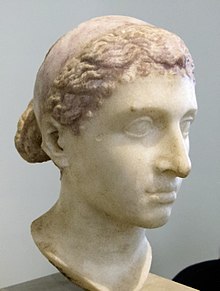
by fljustice | Apr 30, 2011 | Books, Fiction, Reviews
“Anthony and Cleopatra” by Colleen McCullough
I’m on a bit of a Cleopatra kick. Last week I reviewed the biography Cleopatra: A Life by Stacy Schiff. This week it’s a novel by Colleen McCullough. From the book jacket:
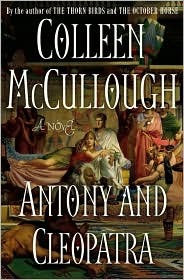 “Caesar is dead, and Rome is, again, divided. Lepidus has retreated to Africa, while Antony rules the opulent East, and Octavian claims the West, the heart of Rome, as his domain. Though this tense truce holds civil war at bay, Rome seems ripe for an emperor—a true Julian heir to lay claim to Caesar’s legacy. With the bearing of a hero, and the riches of the East at his disposal, Antony seems poised to take the prize. Like a true warrior-king, he is a seasoned general whose lust for power burns alongside a passion for women, feasts, and Chian wine. His rival Octavian, seems a less convincing candidate: the slight golden haired boy is as controlled as Antony is indulgent and as cool-headed and clear-eyed as Antony is impulsive. Indeed, the two are well- matched only in ambition.”
“Caesar is dead, and Rome is, again, divided. Lepidus has retreated to Africa, while Antony rules the opulent East, and Octavian claims the West, the heart of Rome, as his domain. Though this tense truce holds civil war at bay, Rome seems ripe for an emperor—a true Julian heir to lay claim to Caesar’s legacy. With the bearing of a hero, and the riches of the East at his disposal, Antony seems poised to take the prize. Like a true warrior-king, he is a seasoned general whose lust for power burns alongside a passion for women, feasts, and Chian wine. His rival Octavian, seems a less convincing candidate: the slight golden haired boy is as controlled as Antony is indulgent and as cool-headed and clear-eyed as Antony is impulsive. Indeed, the two are well- matched only in ambition.”
The Masters of Rome
Anthony and Cleopatra is the last of seven novels, collectively called the Masters of Rome series, covering the end of the Roman Republic in all its twisted glory. The result of this herculean task, is a legacy of some of the best researched historical fiction of this time; meticulously covering politics, battles, people, religious rites, traditions, trade, architecture, etc. The best books of the series draw the reader in with fascinating characters, Machiavellian plots, and scintillating detail. The worst give the reader the sense of reading an entertaining history book. Which is not, necessarily, a bad thing. McCullough had intended to end the saga with The October Horse, but avid fans prevailed and she concluded with this novel, which shows the final end of the Republic and beginning of Empire. (more…)

by fljustice | Apr 26, 2011 | Biographies, Books, Reviews, Wonderful Women
“Cleopatra: A Life” by Stacy Schiff
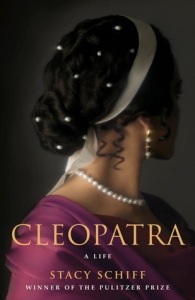 I have a soft spot for strong women in history. I’ve written about Hypatia, the Lady Philosopher of Alexandria; Empress Galla Placidia and her niece Pulcheria who both ruled Rome in its waning days. I’ve read about Boudica, Queen of the Iceni; Amanirenas, the one-eyed warrior queen of Kush; and Zenobia, Queen of Palmyra; all of whom defeated Roman armies, only to succumb later to that massive military machine. Most of my favorites are little known women who ruled countries, commanded armies and navies, dealt astutely with ruling male neighbors and made a difference in their people’s lives. I like to read and write about them because they are little known. I like introducing readers to new characters and broadening the scope of history. Occasionally, I’ll run across a woman I thought I knew, and find out I’m wrong. Cleopatra is one. (more…)
I have a soft spot for strong women in history. I’ve written about Hypatia, the Lady Philosopher of Alexandria; Empress Galla Placidia and her niece Pulcheria who both ruled Rome in its waning days. I’ve read about Boudica, Queen of the Iceni; Amanirenas, the one-eyed warrior queen of Kush; and Zenobia, Queen of Palmyra; all of whom defeated Roman armies, only to succumb later to that massive military machine. Most of my favorites are little known women who ruled countries, commanded armies and navies, dealt astutely with ruling male neighbors and made a difference in their people’s lives. I like to read and write about them because they are little known. I like introducing readers to new characters and broadening the scope of history. Occasionally, I’ll run across a woman I thought I knew, and find out I’m wrong. Cleopatra is one. (more…)
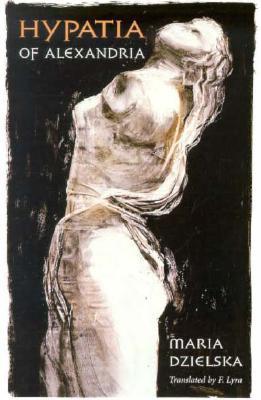
by fljustice | Mar 12, 2011 | Biographies, Books, Hypatia, Reviews, Wonderful Women
Hypatia of Alexandria: Two Books
It’s March—Women’s History Month and the anniversary of a remarkable woman’s death. In AD 415, a Christian mob murdered Hypatia, the renowned Lady Philosopher of Alexandria. The vicious act shocked the city and shamed the early Church. Socrates Scholasticus tells the story in his Historia Ecclesiastica:
“Hypatia, daughter of the philosopher Theon, who made such attainments in literature and science, as to far surpass all the philosophers of her own time…For all men on account of her extraordinary dignity and virtue admired her the more. Yet even she fell a victim to the political jealousy which at that time prevailed. For as she had frequent interviews with Orestes, it was calumniously reported among the Christian populace, that it was she who prevented Orestes from being reconciled to the bishop. Some of them therefore, hurried away by a fierce and bigoted zeal, whose ringleader was a reader named Peter, waylaid her returning home, and dragging her from her carriage, they took her to the church called Caesareum, where they completely stripped her, and then murdered her with tiles. After tearing her body in pieces, they took her mangled limbs to a place called Cinaron, and there burnt them. This affair brought not the least opprobrium, not only upon Cyril, but also upon the whole Alexandrian church. And surely nothing can be farther from the spirit of Christianity than the allowance of massacres, fights, and transactions of that sort. This happened in the month of March during Lent, in the fourth year of Cyril’s episcopate, under the tenth consulate of Honorius, and the sixth of Theodosius.”
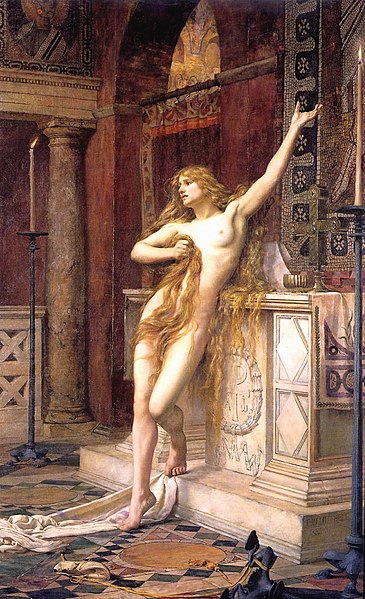
Hypatia, painted by Charles William Mitchell in 1885.
Since that time, only fragments about Hypatia’s life have come down to us; allowing poets, novelists, playwrights, scientists, feminists and religionists (both pro and anti) to appropriate her story for themselves. Her story has resonated down through the years, touching many people. She’s a major character in my novel Selene of Alexandria, the subject of the recent movie Agora directed by Alejandro Amenabar, and she rated a plate in Judy Chicago’s massive art piece The Dinner Party. She’s the subject of plays, poetry, propaganda and new age pagan polemics. Her life is represented in art and music. But what do we really know about her? Not much.
In researching my novel, I waded through a literary swamp, with no guide, trying to get at some coherent view of Hypatia and her story. She was young/middle aged/older when she died. She was single/married/promiscuous/virginal. She was a pagan/witch/Christian. She was a brilliant mathematician/scientist to some and, according to others, contributed nothing worthwhile in either discipline. I read the few primary sources, but didn’t have the academic background to evaluate their usefulness. Socrates was a contemporary, but a church historian. Damascius was a pagan who wrote a full generation later. John of Nikiu wrote 200 years later. Who had an agenda and what was it?
Two scholars have attempted to pull the pieces together in book form in the last two decades: Maria Dzielska, a Polish classics scholar, with Hypatia of Alexandria; and mathematics professor Michael A. B. Deakin with Hypatia of Alexandria: Mathematician and Martyr. I’ve read both, several times, in my research and want to share my thoughts. (more…)
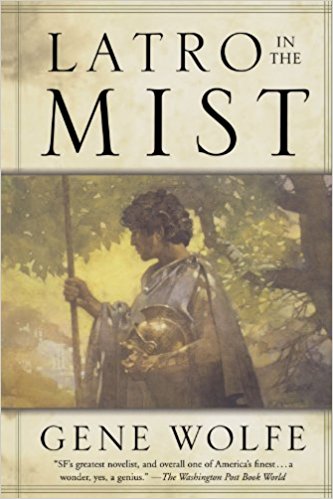
by fljustice | Feb 24, 2011 | Books, Fiction, Reviews
“Latro in the Mist” by Gene Wolfe
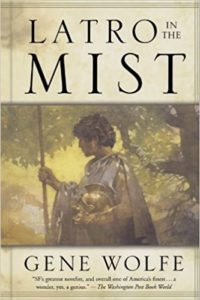 I occasionally run across a book that challenges me; that makes me work for the story and enjoy the labor; that awes me with the craft of the writing. Usually these are considered “literary novels.” I also find a lot of literary novels tedious, because I’m partial to plot-driven stories. But Latro in the Mist surprised me. It’s a fantasy novel with gods and ghosts (which may not be real, see my discussion below.) It’s a historical novel about real events set in Greece in 479 B.C., and populated with historic characters. It’s also a finely crafted literary novel that makes the reader think beyond the story and characters about the nature of memory and self, friendship and loyalty, and the journey that is life. (more…)
I occasionally run across a book that challenges me; that makes me work for the story and enjoy the labor; that awes me with the craft of the writing. Usually these are considered “literary novels.” I also find a lot of literary novels tedious, because I’m partial to plot-driven stories. But Latro in the Mist surprised me. It’s a fantasy novel with gods and ghosts (which may not be real, see my discussion below.) It’s a historical novel about real events set in Greece in 479 B.C., and populated with historic characters. It’s also a finely crafted literary novel that makes the reader think beyond the story and characters about the nature of memory and self, friendship and loyalty, and the journey that is life. (more…)
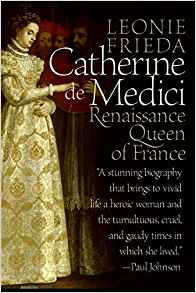
by fljustice | Jan 28, 2011 | Biographies, Books, Reviews, Wonderful Women
“Catherine de Medici: Renaissance Queen of France” by Leonie Frieda
Long, long ago in a youth far, far away, I read a biography of Catherine de Medici, so I was already familiar with her story. I have to admit, the details were hazy: I remembered something about poison, religious wars and that she was Mary, Queen of Scots’ mother-in-law. Then a couple of years ago, my husband and I took a biking vacation in the Loire valley and visited numerous castles and gardens along way, several associated with Catherine and her rival Diane de Poitiers; so I was reacquainted with the general outlines of her story. Which brings me to: Catherine de Medici: Renaissance Queen of France by Leonie Frieda.
 From the Introduction:
From the Introduction:
“Catherine de Medici has variously been called ‘The Maggot from Italy’s Tomb’, ‘The Black Queen’ and ‘Madame La Serpente’. To many she is the very incarnation of evil. It is, I believe, as mistaken a judgment as it is bigoted. Yet it is not far removed from the overall verdict of history on one of the most remarkable women of the sixteenth century.” (more…)

“Caesar is dead, and Rome is, again, divided. Lepidus has retreated to Africa, while Antony rules the opulent East, and Octavian claims the West, the heart of Rome, as his domain. Though this tense truce holds civil war at bay, Rome seems ripe for an emperor—a true Julian heir to lay claim to Caesar’s legacy. With the bearing of a hero, and the riches of the East at his disposal, Antony seems poised to take the prize. Like a true warrior-king, he is a seasoned general whose lust for power burns alongside a passion for women, feasts, and Chian wine. His rival Octavian, seems a less convincing candidate: the slight golden haired boy is as controlled as Antony is indulgent and as cool-headed and clear-eyed as Antony is impulsive. Indeed, the two are well- matched only in ambition.”





